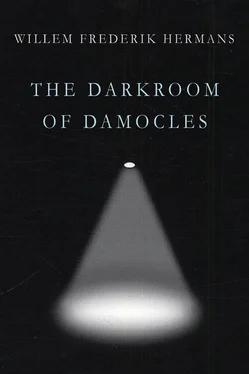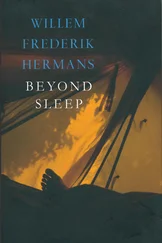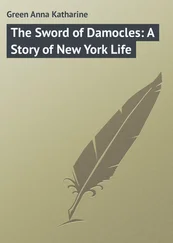‘Henri! Who can be phoning us in the middle of the night?’
The alarm clock said quarter past four. Outside it was already light. There was plenty of birdsong but also the drone of aircraft — several of them.
Now he heard the phone ringing, too.
‘How should I know?’
Osewoudt got out of bed and went downstairs. As he stepped into the shop he saw a big lorry full of soldiers drive past. The phone rang again.
‘Osewoudt tobacconists.’
‘Osewoudt, this is your Home Guard commander speaking! Get your uniform on and come to the town hall as quick as you can! It’s war! The Germans have attacked, they’re dropping parachutes all over the place. Come at once!’
From the bottom of the stairs he shouted: ‘Ria! The Germans have attacked! They want me at the town hall!’
He went to the back room and took his uniform from the cupboard. The uniform was dark green, like a forestry man’s. A German helmet went with it, army surplus from the Great War.
Walking down the street, he hoped the Germans had adopted a new style of helmet in the interim. If they hadn’t, who knows what might happen to him?
Three big, black aeroplanes appeared, flying low. Not far off he could hear the pounding of field guns. There were a lot of people about, talking and pointing at the sky.
Until late afternoon he stood guard at the post office, where crowds were gathering to draw out their savings. From time to time the Germans left big white mushrooms behind in the blue, cloudless sky. The people pointed. Dutch soldiers on motorcycles came past on their way to investigate. The blue trams continued to run as usual. All Osewoudt was allowed to do was stand guard with an old rifle, on the sidelines as usual. In the blazing sunshine, to the accompaniment of birdsong, he was obliged to visualise the monstrous guns for himself. No one had any intention of attacking the post office.
Afterwards, when he got home, he gummed strips of brown paper crosswise over the shop window.
An army lorry pulled up outside. The soldiers jumped down and came into the shop. Osewoudt gave them everything they asked for and refused to take any money.
‘There’s no need for you to do that!’ said a lieutenant.
‘Why not? Just doing my bit. What would you like for yourself? Have these cigars.’
The lieutenant looked at the price and gave Osewoudt one guilder. Then he said: ‘You develop and print photographs, don’t you?’
He pointed to the cardboard sign hanging on the shop door. The sign had several snapshots pasted to it, and announced that rolls of film left in the letter box would be developed, printed, and ready for collection in forty-eight hours.
The lieutenant took a roll of film from his pocket.
‘Just leave it to me,’ said Osewoudt. ‘I’ll do my best, but I can’t promise the pictures will be ready the day after tomorrow. What’s the name?’
‘Dorbeck. With ck.’
Osewoudt wrote ‘Dorbeck’ on the film, with ck.
‘My name is Osewoudt, with dt,’ he said, putting the roll in the drawer under the counter.
‘Then our names have something in common.’
The officer shook hands with Osewoudt, looking him straight in the eye. Osewoudt noted that the man’s eyes were exactly level with his. They were grey-green eyes, and seemed surprised at what they saw. He had never felt anyone’s eyes on him in this way, except when he looked at himself in the mirror.
‘You’re the same height as me,’ Osewoudt said, ‘and I was turned down for military service.’
‘So was I, almost. But I stretched myself.’
Dorbeck laughed. His white teeth were so even and close-set they looked like two transverse blades of ivory. His hair was black, and a shadow of stubble tinged his jawline with blue. This made his face look even paler, although there were spots of red on his cheekbones. He had a voice like a bronze bell.
‘Thanks,’ he said. ‘They don’t need to be ready the day after tomorrow, as I shan’t be back by then. But I’ll be back, you can be sure of that.’ He walked out of the shop and jumped into his lorry.
Osewoudt followed him with his eyes. When he turned round he saw Ria standing between the sliding doors.
‘Who was that?’
‘Oh, nobody in particular.’
‘He looked exactly like you, the way a photo negative looks like the positive.’
‘He was passed for military service and I wasn’t.’
‘No wonder. You look as much like him as a pudding that hasn’t set properly looks like a … let’s see … like a pudding that has set properly. What a scream! Did you let them all go off without paying?’
‘What business is that of yours? You take money from the till without asking.’
‘Yes, I do! It’s my father’s money! I can do what I like with it! Who do you think you are? What would you and your mother live on if you hadn’t married me?’
The Germans arrived in the backs of dusty lorries. The blue tram service had to stop running. The Germans wore the same steel helmets as in the Great War. They confiscated the Dutch Home Guard’s helmets, as well as their uniforms, pistols and old rifles.
Soon the blue tram was running to its normal schedule again. Everything returned to normal, only things were somewhat busier for a while.
Two days later a Dutch army officer on a motorcycle stopped in front of Osewoudt’s shop. When he dismounted, Osewoudt saw it was Dorbeck.
Dorbeck dropped the motorcycle halfway across the pavement and went into the shop.
‘Sorry, your film isn’t ready yet,’ said Osewoudt. ‘I don’t do the work myself, it’s done by somebody in The Hague, but he hasn’t called — because of the war, I expect.’
‘Doesn’t matter.’
Dorbeck sat with one thigh propped on the counter.
‘Is there anyone back there?’ he asked, glancing at the sliding doors.
‘No, my mother’s in bed and my wife is out.’
‘Good. I thought of you because you’re the same height as me. I need you to lend me a suit. I want to get rid of this uniform. I can’t go and give myself up as a prisoner of war. I know Holland has capitulated, but that doesn’t mean to say I have. I’ll capitulate in my own good time.’
Osewoudt went to the room at the back where the wardrobe stood. Dorbeck followed him, already undoing the buttons of his tunic.
‘There was some trouble. What happened was this: I’m on my way to Rotterdam. There’s a bunch of sodding German paratroopers blocking the road. Shots are fired, vehicle kaput, my whole division incapacitated. The Germans make me hand over my pistol and take me with them. But then the bombs start falling and I escape. I flag down one of our trucks and get to Rotterdam. I walk down a street, don’t hear any more bombs, but what do I see? One house after another bursting into flames, just like that. I ask myself how this can be. Great crowds everywhere, people pushing prams loaded with bedding, people with pushcarts and bicycles. Everyone running and shouting. I spot two men in brown overalls. I know right off what their game is, and I stop them. Krauts, of course! They give me a long spiel. Say they’re paratroopers, that they were captured two days ago by our marines and taken to an ordinary prison, for want of a better place, where they were stripped of their uniforms and made to wear those brown overalls instead. When the bombing started the prison governor opened the gates, which is how they came to be walking the streets again.
‘Do you know what I told them? I said: what do you take me for? For an idiot who never reads the papers? The pair of you were smuggled into the country on some freighter before the invasion began! You’re saboteurs! You can start saying your prayers if you’re that way inclined, because you’re about to meet your Maker!
Читать дальше












